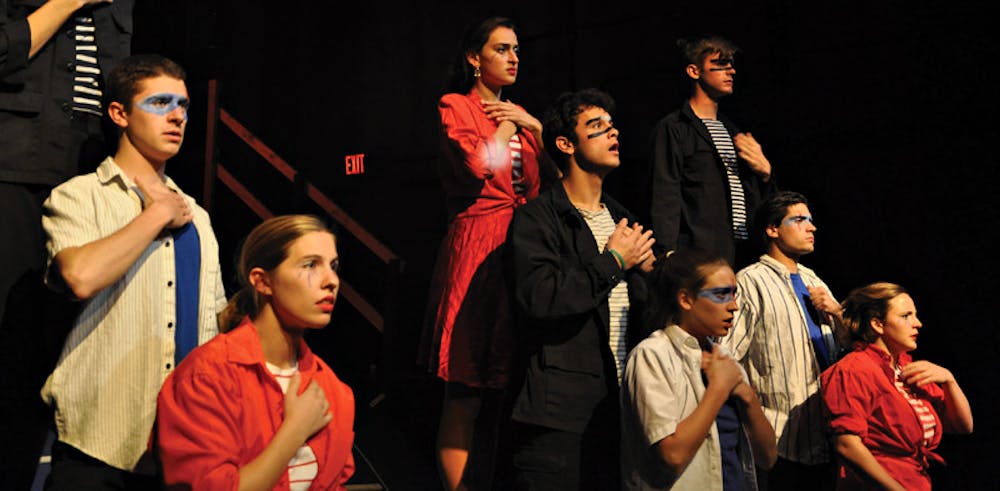Death by drowning is a familiar aesthetic preoccupation. Wading beneath the willow tree with Ophelia, floating with Hokusai in the shadow of Mount Fuji or chasing the white whale with Captain Ahab, readers have been here before. “Drown thyself?” Iago asks in William Shakespeare’s “Othello.” “Drown cats and blind puppies.”
Anxieties about slipping beneath the surface also loom large in “Sink,” a new play written and directed by Ursula Raasted ’14 for the Production Workshop Downspace. It is a deftly chosen title for a work obsessed not only with sinking as a physical and emotional experience, but also with synchronization and synchronicity — with being in and out of sync. Deploying movement, light, sound and text in startlingly original combinations, Raasted renders a dramatic space that is at once completely foreign and disquietingly familiar to our own historical moment.
The play unfolds in nine interconnected, non-sequential vignettes that follow nine anonymous figures through an unsettling, vaguely nautical dream-world. The actors are organized into distinct triplets of “sirens,” “sailors” and “soothsayers,” but also constitute a collective of tangled interchangeable bodies. What at first seems to be a tidy structural framework belies the scope of Raasted’s ambition — “Sink” swells and contracts, waxes and wanes with the dramatic intensity of a capsizing freighter.
The plot centers on a series of ill-fated romantic encounters between the sirens and sailors, who are paired off into couples and assigned private dramas. The soothsayers provide a kind of dialectic, variously interjecting, intervening and interpreting exchanges. The couples are plagued by miscommunication, desperately out of sync. In one scene, a couple, played by Simon Henriques ’15 and Jillian Jetton ’14, argue in a garbled jargon the audience can barely make out. The performance circles relentlessly around the failure of language to articulate what the players would like to say.
Of course, the script is only a fraction of what makes “Sink” float. Tightly choreographed movement sequences supply much of the narrative content. Military marches and dance-like pantomimes lend the production a rhythmic lyricism. In one scene, bodies lurch forward and backward on a simple wooden frame to imitate a maritime expedition. The nine actors have achieved a remarkably cohesive gestural vocabulary that operates on equal footing with the text.
“We devised a lot of the movement in the piece through rehearsals,” Raasted said. “The script has been redrafted and rewritten throughout as we figured out where we’re going.”
Sound also animates the work, with electronic pulses suggesting crashing waves and brooding storms. The most compelling passages come from the sirens, for whom Raasted has written an original three-part harmony in repeating melodic units — think the opening measures of Björk’s “Medulla” via Phillip Glass. “Anything can be anything,” we are told, “when you put it on a loop.” Becca Millstein ’16 is especially evocative.
Order repeatedly threatens to collapse. As Odysseus reminds us, sailors and sirens are a perilous combination. When one member of the tribe falls out of step, the others seize upon him. “If you have something to say,” they demand, “then spit it out.” Without names or distinct personalities, the actors struggle to distinguish between individual and collective identity. “Show me your teeth so that I can recognize you,” they plead to one another.
Stomping around checking their pulses, the sailors, sirens and soothsayers alike are desperate to make sense of a world punctuated by violence and miscommunication. A sailor orders a siren to drown nine kittens. A Dalmatian is shipped off to space, sacrificed for science. Lifeguards remind us that drowning can look a lot like waving. In the work’s most powerful monologue, Patrick Madden ’15 insists, wide-eyed, “We are all treading water. We are all going nowhere.”
Luckily, Raasted had the foresight to interrupt the existential anxiety with some unapologetic fun. Moments of cataclysm are framed by moments of unhinged celebration, including a delightful outburst of synchronized swimming, delivered semi-clothed with manic, Mickey Mouse Club smiles.
There’s a lot to unpack in “Sink.” Messy, experimental and sometimes deliberately opaque, it won’t be hemmed in. But submit to Raasted’s strange, vividly realized universe. Fill your pockets with stones and descend into the riverbed. You might find yourself eerily at home.

ADVERTISEMENT




